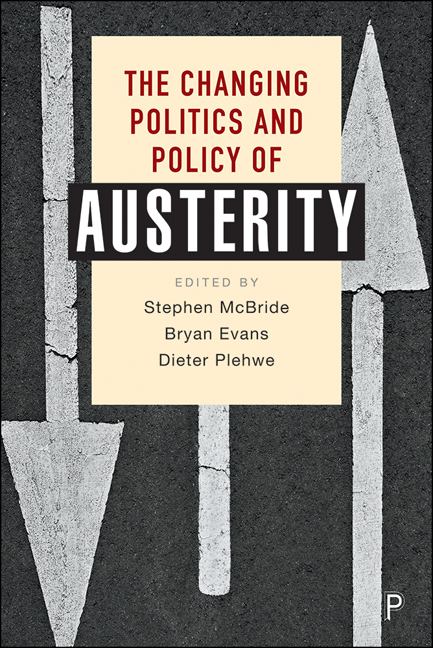Book contents
- Frontmatter
- Contents
- List of figures and tables
- Notes on contributors
- Acknowledgements
- Introduction
- PART I Austerity and the promotion of the private
- PART II Coping and casualties: labour and the social
- PART III Beyond coping: protest, pathologies and the development of real alternatives
- Conclusion
- Index
12 - The crisis next time: the GFC and the continuing fragility of capitalism
Published online by Cambridge University Press: 13 May 2022
- Frontmatter
- Contents
- List of figures and tables
- Notes on contributors
- Acknowledgements
- Introduction
- PART I Austerity and the promotion of the private
- PART II Coping and casualties: labour and the social
- PART III Beyond coping: protest, pathologies and the development of real alternatives
- Conclusion
- Index
Summary
Capitalism shows an innate tendency to repeated cycles of boom and bust. Many factors can serve as the proximate cause of these cyclical fluctuations: including supply shocks in production of key resources and other inputs, fluctuations in the sentiment and confidence of business leaders and consumers, volatility in the supply of credit (which fuels spending and expansion) or changes in macroeconomic policy (such as interest rates or government spending). Whatever the immediate cause of each cycle, inherent cyclical instability reflects common features embedded within capitalism, including:
• Growth and development are led, first and foremost, by profit-seeking capital investments made by private businesses. If they stop investing, output and employment stop growing or start to shrink.
• But those individual decisions to invest are independent, uncoordinated and subject to volatile shifts in sentiment and expectations.
• This decentralization facilitates coordination failures, whereby individual investors make seemingly rational decisions that damage the whole economy (and hence the collective of businesses).
• Inter-sectoral and international flows of production, trade and investment can spread the effects of any initial sectoral downturn into the broader economy – again facilitated by the lack of coordination of the system.
• Personal consumption is the largest component of total output and spending, but it generally follows economic cycles (rather than leading them) since it depends on the prior existence of employment and labour income. If investment and employment decline, consumer spending also declines – magnifying the resulting shock to total output and employment.
• Fundamental uncertainty exacerbates this instability. Forward-looking investment judgements are inherently uncertain, since future economic and business conditions are unknowable, and herd-like shifts in expectations about the future further amplify shocks.
• The overdevelopment of financial activities, products and linkages (called financialization) accelerates this volatile mix. Hyperactive and very complex financial linkages amplify shocks and accelerate their contagion.
Given this volatile mix, the question is not whether capitalism will experience another crisis – but when, where and specifically why. Indeed, the history of neoliberalism is one of regular crises (Duménil and Lévy 2011; Boyer 2013), marked by increasing rapidity of onset, amplitude and global reach.
- Type
- Chapter
- Information
- The Changing Politics and Policy of Austerity , pp. 248 - 271Publisher: Bristol University PressPrint publication year: 2021



